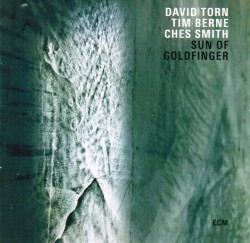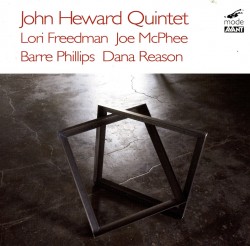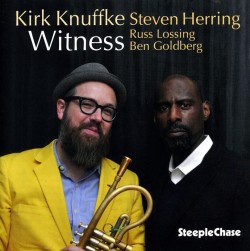As difficult as the idea of creating sophisticated improvisational music may sometimes seem, even more fraught with challenges is finding the inspiration behind any improvisation. Creation may be singular or involve ensembles of varying size, while the influence or incentive for the work may result from examining a work of art, an historical action, a physical or spatial location or even a realized sonic concept. Each of these notable discs defines inspirations in a unique fashion.
 Take American violinist Jason Kao Hwang’s Blood (True Sound Recordings TS1 jasonkaohwang.com). His eight-member Burning Bridge ensemble mixes Eastern (pipa and erhu) and Western (three brass, double bass and drums) instruments on five of Hwang’s polychromatic compositions which make their points by twisting varied musical strands, but without trading efficiency for exoticism. Although reflecting on trauma inflicted on his mother in China and his associates in the Vietnam War, Blood isn’t agitprop. Instead, melancholy and aggression are portrayed through sounds. For instance, on the title track, stop-time counterpoint from Steve Swell’s trombone projecting from a bellicose march driven by Andrew Drury’s drums cedes space to delicate textures from Wang Guowei’s erhu and Sun Li’s pipa. Although the concluding Declarations references and resolves the CD with a peaceful overlay consisting of chromatic pipa strums plus pedal-point modulations from Swell and tubist Joseph Daley, theatrical woe is balanced by sophisticated virtuosity. Giving the Asian instruments parts that unselfconsciously swing, some of Hwang’s other tunes skip and soar with lively inferences. The two-part Surge for example, finds string parts swirling around Taylor Ho Bynum’s graceful, kinetic cornet, and if Hwang’s violin solo impresses with calculated flying spiccato then so do Li’s crunching strums with a blues sensibility closer to the Mississippi river than the Yangtze. Surge Part 2 is more memorable, since not only does Daley confirm his breath control as he matter-of-factly slides from basso-like to sopranino-like tones, but the composition’s uniqueness is confirmed when Hwang’s bluesy sweeps and Swell’s plunger yelps erupt from within a sequence that emphasizes string stretches from the traditional Chinese instruments.
Take American violinist Jason Kao Hwang’s Blood (True Sound Recordings TS1 jasonkaohwang.com). His eight-member Burning Bridge ensemble mixes Eastern (pipa and erhu) and Western (three brass, double bass and drums) instruments on five of Hwang’s polychromatic compositions which make their points by twisting varied musical strands, but without trading efficiency for exoticism. Although reflecting on trauma inflicted on his mother in China and his associates in the Vietnam War, Blood isn’t agitprop. Instead, melancholy and aggression are portrayed through sounds. For instance, on the title track, stop-time counterpoint from Steve Swell’s trombone projecting from a bellicose march driven by Andrew Drury’s drums cedes space to delicate textures from Wang Guowei’s erhu and Sun Li’s pipa. Although the concluding Declarations references and resolves the CD with a peaceful overlay consisting of chromatic pipa strums plus pedal-point modulations from Swell and tubist Joseph Daley, theatrical woe is balanced by sophisticated virtuosity. Giving the Asian instruments parts that unselfconsciously swing, some of Hwang’s other tunes skip and soar with lively inferences. The two-part Surge for example, finds string parts swirling around Taylor Ho Bynum’s graceful, kinetic cornet, and if Hwang’s violin solo impresses with calculated flying spiccato then so do Li’s crunching strums with a blues sensibility closer to the Mississippi river than the Yangtze. Surge Part 2 is more memorable, since not only does Daley confirm his breath control as he matter-of-factly slides from basso-like to sopranino-like tones, but the composition’s uniqueness is confirmed when Hwang’s bluesy sweeps and Swell’s plunger yelps erupt from within a sequence that emphasizes string stretches from the traditional Chinese instruments.
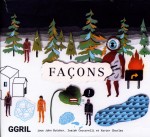 Concerned with the realization of musical concepts, rather than reflecting tangible actions or emotions, is Façons (Microcidi 014 tourdebras.com), a two-CD set where the 20-odd members of Rimouski, Quebec-based GGRIL interpret free music tropes created specifically for the ensemble. Describing exactly his aim, Organon, by Montreal’s Isaiah Ceccarelli, aims to transform the orchestra into a gigantic pipe organ, and the inflated crescendo which introduces the piece does just that with a collection of tremolo polyrhythms and polytones making distinctive sonic colours judder every which way. As the organ-like chording intensifies however, helped by wave form pressure from GGRIL’s low-energy synthesizers, individual contributions such as Alexandre Robichaud’s trumpet slurps, undulating split tones from all four reedists, plus bell clangs and glockenspiel smacks from percussionist Antoine Létourneau-Berger, bring singular personalities forward. By the climactic finale, brass and reed parts retain the concentrated theme, while fissures in the form of idiosyncratic runs from the three electric guitarists, percussion and two violinists create a contrapuntal challenge. On disc two, rather than concentrated textures, London-based soprano saxophonist John Butcher, who joins the group as it plays his six-part Local Fixations, emphasizes tonal contrasts. As metallic guitar frails from Olivier D’Amours and Robert Bastien sharpen the exposition, string section modulations join with Robin Servant’s accordion vibrations to create divergent drones. By midpoint, the development divides between solo snatches of high-pitched flute echoes, reed bites and fiddle sweeps plus stop-time from the entire ensemble. An interval of triple-tongued saxophone, bowed bass and guitar plucks creates wider intervals on the penultimate Collective Memories II until cogwheel ratchets signal a hushed interval. A concluding sequence, Floating Amphora emphasizes sul ponticello string bowing, mechanized thumps, cawing brass and reed cries as well as tough rebounds from Éric Normand’s electric bass; a final orchestral tutti sways into conclusive snorts from Gabriel Rochette-Bériau’s trombone and Mathieu Gosselin’s baritone saxophone that blur the disparate timbres into a distinctive finale.
Concerned with the realization of musical concepts, rather than reflecting tangible actions or emotions, is Façons (Microcidi 014 tourdebras.com), a two-CD set where the 20-odd members of Rimouski, Quebec-based GGRIL interpret free music tropes created specifically for the ensemble. Describing exactly his aim, Organon, by Montreal’s Isaiah Ceccarelli, aims to transform the orchestra into a gigantic pipe organ, and the inflated crescendo which introduces the piece does just that with a collection of tremolo polyrhythms and polytones making distinctive sonic colours judder every which way. As the organ-like chording intensifies however, helped by wave form pressure from GGRIL’s low-energy synthesizers, individual contributions such as Alexandre Robichaud’s trumpet slurps, undulating split tones from all four reedists, plus bell clangs and glockenspiel smacks from percussionist Antoine Létourneau-Berger, bring singular personalities forward. By the climactic finale, brass and reed parts retain the concentrated theme, while fissures in the form of idiosyncratic runs from the three electric guitarists, percussion and two violinists create a contrapuntal challenge. On disc two, rather than concentrated textures, London-based soprano saxophonist John Butcher, who joins the group as it plays his six-part Local Fixations, emphasizes tonal contrasts. As metallic guitar frails from Olivier D’Amours and Robert Bastien sharpen the exposition, string section modulations join with Robin Servant’s accordion vibrations to create divergent drones. By midpoint, the development divides between solo snatches of high-pitched flute echoes, reed bites and fiddle sweeps plus stop-time from the entire ensemble. An interval of triple-tongued saxophone, bowed bass and guitar plucks creates wider intervals on the penultimate Collective Memories II until cogwheel ratchets signal a hushed interval. A concluding sequence, Floating Amphora emphasizes sul ponticello string bowing, mechanized thumps, cawing brass and reed cries as well as tough rebounds from Éric Normand’s electric bass; a final orchestral tutti sways into conclusive snorts from Gabriel Rochette-Bériau’s trombone and Mathieu Gosselin’s baritone saxophone that blur the disparate timbres into a distinctive finale.
 Shrinking the personnel down to one and the inspiration to description, is Lisbon-based cellist Ulrich Mitzlaff’s Sonic Miniatures about Edvard Munch’s “The Scream” (Creative Sources CS 531 CD creativesources.com), During ten brief tracks, Mitzlaff’s cello figuratively examines the famous Norwegian painting from every perspective, using extended techniques to make each diminutive track distinctive. The most significant is Miniature #5, a multi-hued sketch in itself. Beginning with the sound of the bow clattering on the ground, it evolves to resonating pizzicato plucks advanced one at a time in ascending pitches, until aggregate stops vibrate all strings with below-the-bridge drags, and then suddenly fade to one concluding twang. Shaded differently, Miniature #9 is almost as dramatic, with speedy spiccato shuffles shading the melody as it moves at a frenetic pace, only to end with lulling timbres. Also displaying col legno pops, chamber music-like formalism, sul ponticello echoes, distinctive low pitches and strongly focused stops, the cellist doesn’t echo the message of Munch’s painting as much as create a distinctive art work of his own.
Shrinking the personnel down to one and the inspiration to description, is Lisbon-based cellist Ulrich Mitzlaff’s Sonic Miniatures about Edvard Munch’s “The Scream” (Creative Sources CS 531 CD creativesources.com), During ten brief tracks, Mitzlaff’s cello figuratively examines the famous Norwegian painting from every perspective, using extended techniques to make each diminutive track distinctive. The most significant is Miniature #5, a multi-hued sketch in itself. Beginning with the sound of the bow clattering on the ground, it evolves to resonating pizzicato plucks advanced one at a time in ascending pitches, until aggregate stops vibrate all strings with below-the-bridge drags, and then suddenly fade to one concluding twang. Shaded differently, Miniature #9 is almost as dramatic, with speedy spiccato shuffles shading the melody as it moves at a frenetic pace, only to end with lulling timbres. Also displaying col legno pops, chamber music-like formalism, sul ponticello echoes, distinctive low pitches and strongly focused stops, the cellist doesn’t echo the message of Munch’s painting as much as create a distinctive art work of his own.
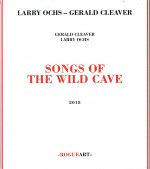 Original methods of using spatial considerations inspire two other sessions. Songs of the Wild Cave (RogueArt ROG 0084 roguart.com) was recorded in the dark and silence of a Paleolithic cave in southwestern France by Americans, saxophonist Larry Ochs and drummer Gerald Cleaver. The other CD was recorded in the Chihuahuan Desert in West Texas by American alto saxophonist Joe McPhee and tenor saxophonist John Butcher, far removed from GGRIL. Named for the massive brick sculptures constructed in the desert by a reclusive American sculptor, the improvisations on At the Hill of James Magee (Trost TR174 CD trost.at) were created as much in the desert air as inside the shale-rock structures.
Original methods of using spatial considerations inspire two other sessions. Songs of the Wild Cave (RogueArt ROG 0084 roguart.com) was recorded in the dark and silence of a Paleolithic cave in southwestern France by Americans, saxophonist Larry Ochs and drummer Gerald Cleaver. The other CD was recorded in the Chihuahuan Desert in West Texas by American alto saxophonist Joe McPhee and tenor saxophonist John Butcher, far removed from GGRIL. Named for the massive brick sculptures constructed in the desert by a reclusive American sculptor, the improvisations on At the Hill of James Magee (Trost TR174 CD trost.at) were created as much in the desert air as inside the shale-rock structures.
On Songs of the Wild Cave though, shadowy haze masking prehistoric cave paintings and stone walls dripping moisture become part of the program as Ochs and Cleaver first tentatively and then sonorously pierce the oppressive quiet with contemporary noises. Fully acclimatized, midway through the program with a track literally titled Deeper, Ochs’ combination of glossolalia, horn shakes, reed bites and dyspeptic tones breech the opaque air to such an extent that reed cries could bring out ghosts of more than Albert Ayler. Meanwhile the drummer complements these saxophone spurts with cymbal smacks, wood pops and rebounding patterns. Adapting to the cave’s spatial qualities, by Ringing It In, the saxophonist’s harsh narrow vibrations and squealing split tones seem to be figuratively digging through the murk and the clay-encrusted walls beyond. Dispersing the cavern’s chill, the drummer performs a similar feat, warming the air with subtle tambourine and maracas-like shakes and bass-drum smacks. As the improvisations thicken on the penultimate Rooted in Clay, a quasi-melody, never previously heard in these primeval surroundings is constructed out of repeated breaths, slurs and vocalized cries, and moulded linearly with bell ringing and rattling strokes. When wide honks and inflated multiphonics bounce off the earth and rocks during the final extended Light from the Shadows, it appears as if the title’s promise is fulfilled; Cleaver’s subsequent near-bebop rhythm, decorated with intermittent saxophone peeps, confirms the sound illumination.
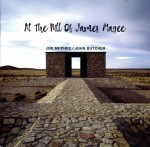 Inventively displaying meditations on a comparable structural challenge on At the Hill of James Magee, at least McPhee and Butcher had the advantage of defining their art above ground. At the same time, the opportunity to produce sounds within and outside 40-foot high edifices, made of shale with iron doors and encompassing shattered glass, rust, flowers and textile shards, is as daring as it is unique. Turning acoustics to advantage, natural amplification makes saxophone strategy stand out even more. On Mine Shaft for instance, the width of a pit is marked with circular breathing, that while touching the saxophone’s highest reaches, also relaxes into a melodic theme. Oddly, the echoes on Butcher’s Paradise Overcast, more than the previous improvisation, reflect a near-bottomless pit, as his darkened slurs and key percussion are coordinated into a rhythmic smear. Otherwise using vamps and asides to emphasize tonal differences between their horns, the duo’s most profound application of this spatial inspiration is the almost 21-minute introductory Sometimes Yes, Sometimes No. Apparently convening from opposite angles of the structures, ghostly reed tones connect in concentric circles of growls and buzzes that inflate as they deepen. The alto saxophonist’s moderated tone and the tenor saxophonist’s harsh overblowing fragment in a climatic intermezzo after which watery but lyrical timbres predominate. Individual textural variations appear before a protracted pause with a finale that balances McPhee’s narrowed tweets with dampened snarls from Butcher.
Inventively displaying meditations on a comparable structural challenge on At the Hill of James Magee, at least McPhee and Butcher had the advantage of defining their art above ground. At the same time, the opportunity to produce sounds within and outside 40-foot high edifices, made of shale with iron doors and encompassing shattered glass, rust, flowers and textile shards, is as daring as it is unique. Turning acoustics to advantage, natural amplification makes saxophone strategy stand out even more. On Mine Shaft for instance, the width of a pit is marked with circular breathing, that while touching the saxophone’s highest reaches, also relaxes into a melodic theme. Oddly, the echoes on Butcher’s Paradise Overcast, more than the previous improvisation, reflect a near-bottomless pit, as his darkened slurs and key percussion are coordinated into a rhythmic smear. Otherwise using vamps and asides to emphasize tonal differences between their horns, the duo’s most profound application of this spatial inspiration is the almost 21-minute introductory Sometimes Yes, Sometimes No. Apparently convening from opposite angles of the structures, ghostly reed tones connect in concentric circles of growls and buzzes that inflate as they deepen. The alto saxophonist’s moderated tone and the tenor saxophonist’s harsh overblowing fragment in a climatic intermezzo after which watery but lyrical timbres predominate. Individual textural variations appear before a protracted pause with a finale that balances McPhee’s narrowed tweets with dampened snarls from Butcher.
Whether rooted in cerebral hypothesis or a physical object, fascinating improvisations can have many sources. These CDs show some of the ways this happens.
 Guitarist and poet, Toronto-born, Nova Scotia resident Arthur Bull enjoys a compound musical identity. He has been a part of the Canadian improvising community for decades, developing a personal idiom that draws in equal parts from the extended techniques of free improvisation and the slide and finger-style traditions of blues and folk idioms. These two CDs, from Spring 2018, present Bull in radically different, if equally radical settings.
Guitarist and poet, Toronto-born, Nova Scotia resident Arthur Bull enjoys a compound musical identity. He has been a part of the Canadian improvising community for decades, developing a personal idiom that draws in equal parts from the extended techniques of free improvisation and the slide and finger-style traditions of blues and folk idioms. These two CDs, from Spring 2018, present Bull in radically different, if equally radical settings.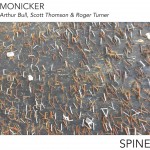 Among Bull’s international associations is one formed in 2002 with drummer Roger Turner, a charter member of the British school of free improvisation. Turner’s sometimes machine-like approach can be traced directly to an early appreciation of the brilliant precision of Dave Tough, the drummer who propelled the rise of Chicago jazz over 90 years ago. Anyone who imagines free improvisation to be somehow vague in its contours simply hasn’t heard Roger Turner. In 2018 Bull and Turner expanded their duo with the addition of trombonist Scott Thomson for a tour (as Monicker) that stretched from Southern Ontario to Nova Scotia.
Among Bull’s international associations is one formed in 2002 with drummer Roger Turner, a charter member of the British school of free improvisation. Turner’s sometimes machine-like approach can be traced directly to an early appreciation of the brilliant precision of Dave Tough, the drummer who propelled the rise of Chicago jazz over 90 years ago. Anyone who imagines free improvisation to be somehow vague in its contours simply hasn’t heard Roger Turner. In 2018 Bull and Turner expanded their duo with the addition of trombonist Scott Thomson for a tour (as Monicker) that stretched from Southern Ontario to Nova Scotia.


